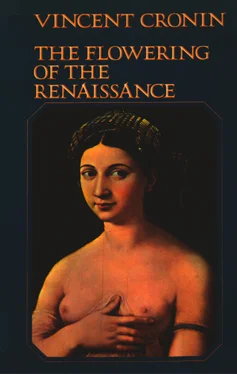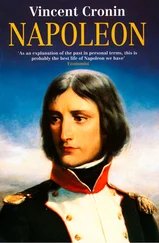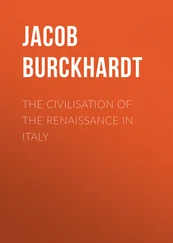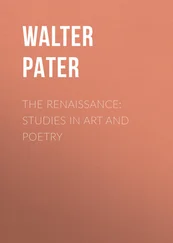Let us take the matter of a pure Latin style. This demanded the use of words sanctioned by classical authors. When poets described SS. Peter and Paul as ‘ Dii tutelares Romae ’, when they translated ‘excommunicate’ by ‘forbid fire and water’, turned ‘to forgive the sins of a dying man’ into ‘to appease the powers of Hades and the Manes’, when faith became ‘persuasion’, a priest ‘a flamen’, the Vatican ‘the Capitol’ and Mary a ‘goddess’, or even ‘Diana’, they were blurring the distinctiveness of Revelation. Real misunderstanding crept in when Christ was referred to as ‘hero’ or ‘Apollo’, and the Christian message transformed into a ‘philosophy’ compatible with the humane ethic of classical Rome. In one of his sermons Tommaso Inghirami compares the death of Jesus to the oratorical power of Cicero because he filled his disciples first with sadness and consternation, then with triumphant joy. He then likens Jesus to Curtius, Cecrops, Aristides, Epamonidas and even Iphigenia, who were all devoted to the common good. The sermon would have horrified Savonarola, all the more since it was delivered on Good Friday, yet his audience considered that Inghirami had surpassed himself.
Closely linked with this danger was another, which Petrarch had been the first to spot. Against Cicero’s statement in the De Natura Deorum that men are quite willing to attribute their prosperity to the gods, but not their virtue—‘ virtutem autem nemo deo acceptam rettulit ,’ Petrarch had written ‘ Cave male dicas : Be careful what you say.’ The poet’s warning went unheeded among the leading spirits of Leo’s Rome. Even the pious Sadoleto described wisdom as a human virtue naturally acquired, and declared that sages such as Socrates, Plato and Cicero were in every respect complete and perfect men, despite the fact that they had never received the Church’s grace-giving sacraments. Formerly man was deemed to have value only in so far as he partook of heavenly grace, but now it was man who had value in himself, and Vasari could write of Raphael after his death: ‘We can be sure that just as he embellished the world with his talent, so his soul now adorns heaven itself.’ This exaltation of man was of course a form of osmosis in a world flooded by classical values. If there was any betrayal of Christian truth, it was quite unconscious. It was none the less dangerous for that, especially if doings or phrases were to be interpreted out of context by men living far from Rome and unfamiliar with her new, rather peculiar conventions.
Exaltation of man led to exaltation of particular men, notably the Popes. It has to be remembered that fulsome language was a feature of the age: the satirist Pietro Aretino was variously addressed as ‘ Precellentissimo ’, ‘ Unichissimo ’, ‘ Divino ’, and ‘ Omnipotente ’, but in Rome adulation went beyond bounds. Orators and poets addressed the Pope as once their forbears had addressed those Emperors who believed themselves divine. Inghirami hailed Julius as a Jupiter making the universe tremble with his frown, a Dominican poet compared Leo to the sun-god Apollo, while Giovanni Capito addressed these lines to the elephant Annone:
If you think you are serving a Libyan Lion
You err: this Leo came down from the skies.
He is your master, the world’s highest glory,
Whose head is crowned with the tiara,
Holding among men a more than mortal rank:
With the right to close and open the world’s frontiers.
If to serve God is truly to reign, then you,
As Leo’s servant, truly reign, Leo being God on earth.
Like every great lord, Leo had his ‘taster’ to sample all food for possible poison, but against this particular kind of poisonous sugar he had no one to defend him, and the tragedy is that sometimes he succumbed. When his brother Giuliano died in 1516 it was expected that Leo would order the Court into mourning and take part in the solemn funeral ceremonies. But Leo decided otherwise. A Pope, he informed his master of ceremonies, should place himself above family griefs: he should consider himself ‘ quia ipse jam non ut homo sed ut semi deus —not as a man, but as a demi-god.’
The final evil of Leo’s reign stems jointly from the peculiar nature of Rome and from the Pope’s character. Rome was not only unproductive, it had no native traditions of craftsmanship or art. So that in civilizing Rome, Leo had to bring everything from outside. The poets came from outside, so did the musicians, the painters, the architects. Of 267 artists who worked in Rome between 1503 and 1605 only seventeen were Romans, and only one—Giulio Romano—became famous. They had to be lured to Rome by high fees, they had to be well housed, and this meant that the cost of civilization was enormously increased. And the man who was paying for all this was open-handed to a fault. ‘ Liberalitas Pontificia ’ proclaimed one of Leo’s medals—and the medal, like everything else commissioned by the Pope, from tiara to silver stirrups—was a beautiful object, designed at great expense. After a game of chess, win or lose, Leo would hand his opponent several gold ducats before blessing the board and leaving. He increased the papal household to 683 and spent on it twice as much as Julius. He would give 50 ducats for one bottle of amber, 500 at a time for sables and ermines, 900 for three gold chains. He gave Guido Postumo 300 ducats and a new house for versifying his hunts, 33 ducats a quarter to a favourite trombonist, a castle and the title of count to a lutenist named Giammaria Leo. He could not possibly afford to be so open-handed, even though papal revenue had risen to 420,000 ducats. As early as 1515 he was in arrears with the pay of his 88 university professors, some of whom began to seek more stable positions elsewhere. And so the scramble for money began.
First thing when he woke, before prayers, before Mass, the datary Gianmatteo Giberti entered the Pope’s bedroom—Leo liked to lie in—and there discussed who should get what benefice and for how much. Bishoprics, abbeys, even quite small parishes—all had their price, and if an applicant held one already, so much the better, because to hold a second he would have to pay. Then there were the saleable offices in the Curia and in the municipality. Leo doubled these to a total of 2150, thus raising 1,200,000 ducats, on which, however, an annual interest of 328,000 ducats had to be paid, since holders received more than 10% return on what was in effect a State investment. But the most profitable item of all was the creation of cardinals, forty-two in all, of whom at least thirty owed their red hats to money or political influence, which in the last resort also meant money: so the Church was no more independent as a result of returning to Rome, only it was now subject to money rather than to the threat of force. Ponzetti, who finally secured the cardinalate at the age of eighty, is said to have stopped a soldier in the street, and removing the soldier’s cap to have measured it thoughtfully. ‘Your hat is two inches bigger than mine, but yours cost one ducat, whereas mine cost 60,000.’ He was not exaggerating.
Even so, income failed to match expenditure, and Leo had to borrow: 32,000 ducats from the Gaddi, with the proviso that one of the family would receive the red hat; from the Ricasoli 10,000; from the father of Cardinal Salviati 150,000. In 1521, when his overdraft reached 156,000 ducats, Leo accorded the Bini brothers, Florentine bankers, the right to sell to the highest bidder offices in the Curia, and as surety gave them Paul II’s jewelled mitre, Julius II’s tiara, and ‘the sacred pontifical silver vessels, including those used for the celebration of divine service’.
Читать дальше












